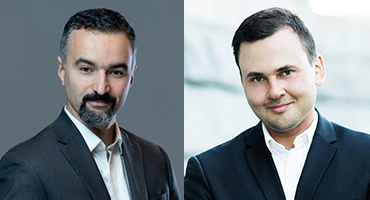UBC scientists partner with Microsoft to develop next generation of cancer imaging and treatment tools

(via UBC Faculty of Medicine) Working alongside data and computer scientists at Microsoft’s AI for Health program, Dr. Arman Rahmim, an associate professor in the department of radiology and in the department of physics & astronomy, and Dr. Ivan Klyuzhin, a postdoctoral research fellow in the department of radiology and also a PhD alumnus of UBC Physics & Astronomy, are developing algorithms to assist radiologists and cancer researchers in the detection and assessment of tumours in PET/CT images.
“The process of image analysis in clinical practice, not just in B.C. but worldwide, is primarily qualitative,” says Dr. Rahmim, the project’s principal investigator and senior scientist at BC Cancer Research Institute (BCCRI). “A specialist must view the image and make an assessment of disease from what they see. Our intention is to develop new technologies using AI that can help better identify and evaluate tumours, with the ultimate aim of impacting care and outcomes for our patients.”
“With the help of AI, we hope to generate more quantitative image metrics for evaluating cancer burden and aggressiveness which could then be used to, for instance, identify those at higher risk for early relapse, and to develop more effective, personalized cancer treatment plans.” he adds.
“Our intention is to develop new technologies using AI that can help better identify and evaluate tumours, with the ultimate aim of impacting care and outcomes for our patients.”
Dr. Arman Rahmim
The current focus of the partnership is on creating algorithms that can automatically detect and delineate prostate cancer tumours in PET/CT images, although these efforts are expected to expand to lymphoma and other cancer variants. The partnership also has the potential to contribute to enhanced AI-assisted cancer screening in BC and worldwide, and the delivery of more precise chemotherapy, radiotherapy and radiopharmaceutical therapy.
“Some of the greatest scientific advances have come from interdisciplinary collaborations,” says Dr. Klyuzhin. “Our partnership with Microsoft’s AI for Health program comes from a lot of hard work to bridge different fields—oncology, radiology, physics and computer science. It is through a combination of knowledge and expertise that we have the potential to create the most innovative technology that could meaningfully improve outcomes for people affected by cancer.”
The group plans to publish their research and openly share the developed AI models online, to make them available for researchers and physicians worldwide. As part of the agreement, the anonymized data shared by BC Cancer, and the AI models and methods developed within the partnership, cannot be used for commercial purposes. The initial application of the models will be for clinical research trials, and the possibility of their use in clinical practice will be investigated.
A version of this story originally appeared on the UBC Faculty of Medicine website.